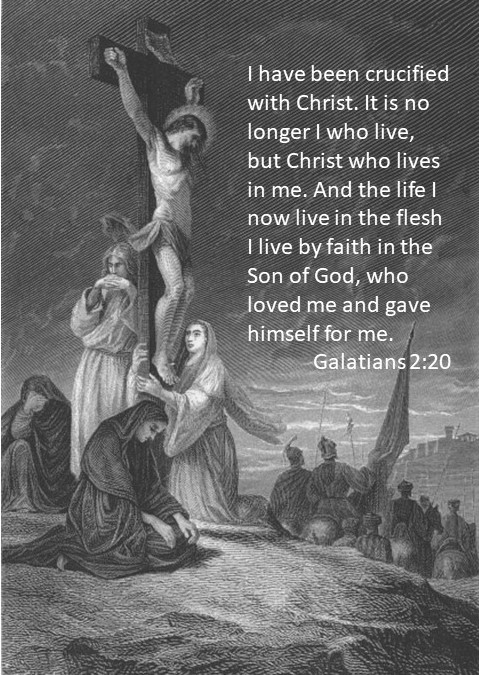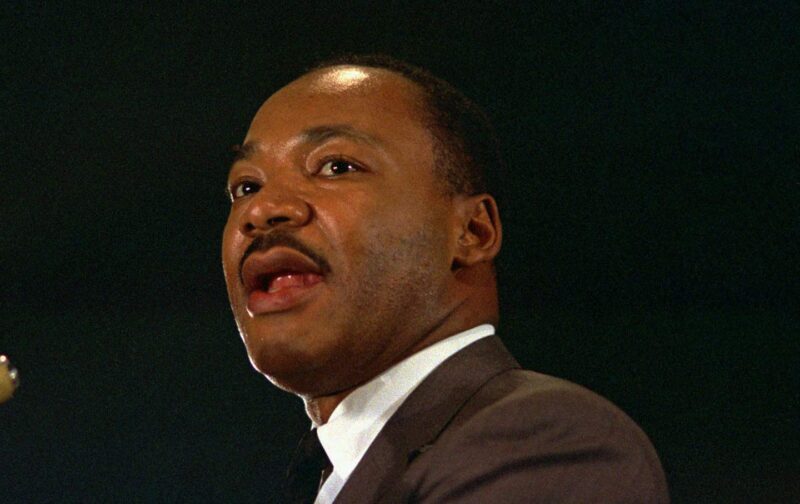The Apostle Peter, in his first epistle, writes to the persecuted church, believers suffering for their faith in Jesus Christ at the hands of Roman authorities and the pagan world. Peter acknowledges that suffering and instructs them how to deal with it in a redemptive way.
 The Apostle Paul, in Galatians 2:20, personalizes the redemptive suffering in his own life: “I have been crucified with Christ. It is no longer I who live, but Christ who lives in me. And the life I now live in the flesh I live by faith in the Son of God, who loved me and gave himself for me.”
The Apostle Paul, in Galatians 2:20, personalizes the redemptive suffering in his own life: “I have been crucified with Christ. It is no longer I who live, but Christ who lives in me. And the life I now live in the flesh I live by faith in the Son of God, who loved me and gave himself for me.”
Paul explains that Christ has given himself for others and now his own suffering, in union with Christ, is for others as well. Likewise, in Colossians 1:24, Paul is rejoicing because he recognizes that his suffering is redemptive for the young church: “Now I rejoice in my sufferings for your sake, and in my flesh I am filling up what is lacking in Christ’s afflictions for the sake of his body, that is, the church.”
In his second letter to his mentee, Timothy, Paul is passing the baton, preparing Timothy for the redemptive suffering he will experience.
- Therefore do not be ashamed of the testimony about our Lord, nor of me his prisoner, but share in suffering for the gospel by the power of God, 2 Tim 1:8.
- Share in suffering as a good soldier of Christ Jesus, 2:3.
- Therefore I endure everything for the sake of the elect, that they also may obtain the salvation that is in Christ Jesus with eternal glory, 2:10.
- As for you, always be sober-minded, endure suffering, do the work of an evangelist, fulfill your ministry, 4:5.
New Testament calls to redemptive suffering
Paul’s words are very clear: his suffering is for the benefit of others! We see this repeatedly in the New Testament.
- Then they left the presence of the council, rejoicing that they were counted worthy to suffer dishonor for the name, Acts 5:41.
- Not only that, but we rejoice in our sufferings, knowing that suffering produces endurance, Romans 5:3.
- For the sake of Christ, then, I am content with weaknesses, insults, hardships, persecutions, and calamities. For when I am weak, then I am strong, 2 Corinthians 12:10.
- Being strengthened with all power, according to his glorious might, for all endurance and patience with joy, Colossians 1:11.
- Now I rejoice in my sufferings for your sake, and in my flesh I am filling up what is lacking in Christ’s afflictions for the sake of his body, that is, the church, Colossians 1:24.
- For you had compassion on those in prison, and you joyfully accepted the plundering of your property, since you knew that you yourselves had a better possession and an abiding one, Hebrews 10:34.
Such passages form the New Testament foundation for that virtue to which Dr. King called the citizens of this great country: redemptive suffering for edification of oneself, others and the nation.
King decried fighting injustice with violence
In his “I Have a Dream” speech, Dr. King identifies the motive and behavior associated with undeserved, redemptive suffering. When attacked, our natural inclination is to fight back, to win by any means necessary, including violence. King encourages nonviolent response to injustice.
But there is something that I must say to my people, who stand on the warm threshold which leads into the palace of justice: In the process of gaining our rightful place, we must not be guilty of wrongful deeds. Let us not seek to satisfy our thirst for freedom by drinking from the cup of bitterness and hatred. We must forever conduct our struggle on the high plane of dignity and discipline. We must not allow our creative protest to degenerate into physical violence. Again and again, we must rise to the majestic heights of meeting physical force with soul force.
These words echo Jesus’ instruction to Peter to put down the sword, and Paul to the Corinthians.
For though we walk in the flesh, we are not waging war according to the flesh. For the weapons of our warfare are not of the flesh but have divine power to destroy strongholds. We destroy arguments and every lofty opinion raised against the knowledge of God, and take every thought captive to obey Christ. 2 Corinthians 10:3-5
Dr. King continues with a remarkable phrase about a marvelous new militancy, not mere pacifism, but nonviolent militancy.
The marvelous new militancy which has engulfed the Negro community must not lead us to a distrust of all white people, for many of our white brothers, as evidenced by their presence here today, have come to realize that their destiny is tied up with our destiny. And they have come to realize that their freedom is inextricably bound to our freedom.
Taking on the weight of justice
Yes, the American experiment in freedom is not for one race or another. It is for the whole human family. The promissory note of the nation’s Founding Fathers was for all the citizens of the United States or it is for none.
Dr. King, and those who marched with him, did not respond to violence with violence. They were peaceful. They took the weight of the injustice upon themselves. They were attacked with water cannons, snarling dogs and night sticks. They were arrested and thrown in jail. They were mocked and ridiculed. And instead of fighting back they met violence with love and resolve. This not only built character in those who suffered, it brought the United States to its knees, brought progress toward the cashing in of America’s “promissory note.”
What King told the Nobel committee
Shortly after his extraordinary address, Dr. King received the Nobel Peace Prize. In his acceptance speech before the committee, he challenged the violence found in slavery, racism, and the use of violence as a means of achieving just ends.
Violence as a way of achieving racial justice is both impractical and immoral. I am not unmindful of the fact that violence often brings about momentary results. Nations have frequently won their independence in battle. But in spite of temporary victories, violence never brings permanent peace. It solves no social problem: it merely creates new and more complicated ones. Violence is impractical because it is a descending spiral ending in destruction for all. It is immoral because it seeks to humiliate the opponent rather than win his understanding: it seeks to annihilate rather than convert. Violence is immoral because it thrives on hatred rather than love. It destroys community and makes brotherhood impossible. It leaves society in monologue rather than dialogue. Violence ends up defeating itself. It creates bitterness in the survivors and brutality in the destroyers.
I might add, per Augustine and Thomas Aquinas, that there is such a thing as a just war. Yet King’s life and tragic death, and the civil rights movement, have led to continued progress on the fulfillment of the promissory note and on King’s goal that his children would not be judged by the color of their skin, but by the content of their character.
Recently, a new segregationist spirit has taken over our nation. We are being divided by a new racism, a call to identify not by our common humanity, but by the color of our skin. This is tragic, or should I say diabolical.
May we have the courage of Dr. King and his followers to understand and to take action to cash in that promissory note and realize that undeserved suffering is redemptive!
- Darrow Miller






